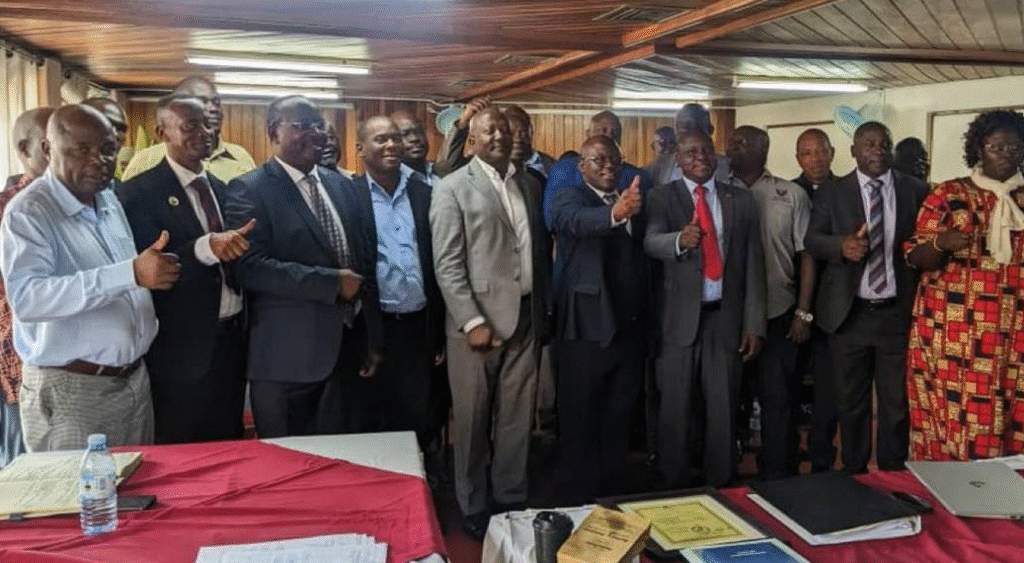
BY JOSEPH KIGGUNDU
The dream of re-establishing a cooperative-owned financial institution in Uganda has moved a decisive step closer to reality after the National Cooperative Savings and Credit Society Limited—precursor to the new National Cooperative Bank—elected its first leadership team. The milestone was achieved during the Society’s inaugural General Assembly, marking a pivotal moment in the revival of a bank owned and governed by Uganda’s cooperative movement.
Presiding over the Assembly, the Minister of State for Cooperatives, Hon. Frederick Gume Ngobi, applauded the delegates for reaching what he called “a new level of organizational maturity.” He reaffirmed government’s commitment to ensuring the cooperative sector regains a strong financial foothold through a fully operational national bank.
Hon. Gume urged the newly elected leaders to adopt sound business practices and prioritize liquidity, strong governance, and strategic branch placement—areas that previously troubled defunct cooperative financial institutions.
“This bank is not just a financial institution—it is a vehicle for economic empowerment of our people,” he said. “We must learn to operate like competitive banks, ensure liquidity, and strengthen governance so this institution stands the test of time.” He pledged to personally save with the bank as one of its founding members.
The Minister also commended the Uganda Cooperative Alliance (UCA) for offering institutional support, including office space, staffing, vehicles, and grassroots mobilization. Such dedication, he noted, underscored the true spirit of cooperative solidarity.
Decades-Long Journey to Restoration
Efforts to revive a national cooperative bank have spanned decades. Uganda’s first cooperative bank, established in 1964, once boasted branches countrywide before its closure in 1999 due to undercapitalization. Renewed momentum came in 2018 when the UCA petitioned Parliament’s COSASE committee, prompting a recommendation to reinstate the bank. Subsequent Cabinet approval and amendments to the Cooperative Act provided the legal basis for establishing a cooperative bank regulated by the Bank of Uganda.
The new cooperative entity was officially registered and later launched by the President on 18 September 2025, cementing its status as a legally recognized cooperative financial institution.

New Board to Lead Operationalization
A seven-member Board was elected to steer the institution into full operationalization. The Board’s responsibilities will include opening corporate accounts, mobilizing cooperative membership nationwide, and setting up governance and management systems.
Elected Board Members:
- Chairperson: Mr. Ivan Asiimwe
- Vice Chairperson: Gen. Sam Kavuma (Wazalendo SACCO)
- Treasurer: Mr. Mureeba Methods (Parliamentary SACCO)
- Members:
- SCP Dr. Wilson Omoding Otuna (Exodus SACCO)
- Mr. Nabende Steven (Walimu Cooperative Union)
- Mr. Sylvester Ndiroramukama (UCSCU)
- Mr. Oyugi Jackson (West Acholi Cooperative Union)
The CEO, once appointed, will serve as an ex-officio Secretary to the Board.
SUPCO and Vetting Committees Elected
To reinforce accountability and governance, the Assembly also elected a three-member Supervisory Committee (SUPCO) to oversee compliance and audit functions:
- Mr. Abasa Ainamani (Banyankole Kweterana)
- Ms. Carolyne Atai (Walimu Cooperative Union)
- Mr. Hakim Bogere
A Vetting Committee was constituted to ensure transparent scrutiny of leadership appointments, comprising:
- Mr. Wakinya Samuel
- Mr. Robert Dramadri
- Counsel Abel Mwesigye
Next Phase: Bank Accounts, Staffing, and Branch Rollout
The Assembly resolved to open the Society’s bank accounts with a reputable commercial bank, with signatory powers assigned to the Chairperson, Treasurer, and Bank Manager. The Board will evaluate available options and report back to members.
With leadership structures now in place, the institution is moving toward staffing, resource mobilization, member recruitment, and the establishment of initial branches through regional cooperative hubs.
The election of the inaugural leadership signals a new chapter for Uganda’s cooperative movement—one rooted in member ownership, financial independence, and renewed trust in cooperative-driven economic development.